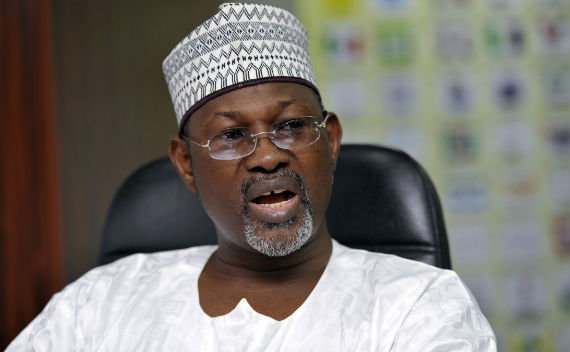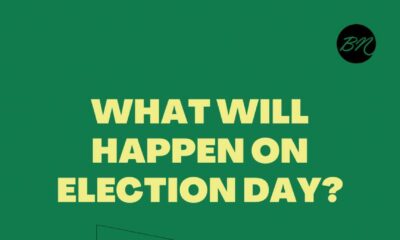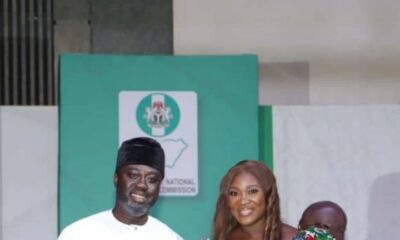News
Naomi Sharang: Appraising International Observers’ Report on Nigeria’s Elections
Preparatory to the just concluded general elections held between March 28 and April 11, the Independent National Electoral Commission (INEC) said that it accredited 107 observer groups to monitor the elections.
The groups included the National Democratic Institute (NDI), the European Union Election Observation Mission and International Republican Institute (IRI).
Johnnie Carson, the leader of the NDI delegation, said that his delegation and IRI reviewed the findings of the pre-election assessment mission from January 15 to January 20.
“The mission collaborated with other international observer missions and worked closely with a coalition of more than 400 Nigerian civil society groups such as the Transition Monitoring Group. NDI delegates submitted reports based on observations from more than 100 polling units in 25 local government areas across nine states and FCT. The exercise represented the possibility of determining the leadership of the country through peaceful, transparent and credible elections,’’ he said.
According to Carson, the elections highlight strong and enthusiastic commitment of Nigerians to democratic processes.
He said that the delegation observed that Nigerian voters conducted themselves in a peaceful and orderly manner during the elections.
He noted that the observers did not seek to interfere in the electoral process but to ensure that stakeholders uphold and respect the citizens’ commitment to democratic process.
He, nonetheless, urged the stakeholders to address immediate challenges experienced during the March 28 Presidential and National Assembly elections and the April 11 governorship and State House of Assemblies’ elections for similar future exercises.
He listed the challenges to include malfunctioning of the card readers which led to “significant delays.”
“Many polling units observed delay due to late arrival of either INEC staff or requisite voting materials.’’
According to him, addressing the challenges would enhance citizens’ confidence, participation and mitigate violence during and after future elections.
Sharing similar sentiments, Christopher Fomunyoh, a member of NDI delegation, urged INEC to review and address the causes of widespread delays in the opening of the polling units.
He noted that relevant authorities should address “issues of severe overcrowding observed in some polling units in some states’’.
He also urged the authorities to provide more voter information for the displaced populations in some parts of the country.
In his opinion, Bill Ritter, a member of NDI delegation, observed that the low number of women candidates in Nigerian elections constituted “a weak link’’ in the country’s democratization efforts.
Ritter expressed concern about only a female candidate that contested the just concluded presidential election on the platform of KOWA party.
He also observed that although the Allied Congress Party of Nigeria, African People’s Alliance, Citizens Popular Party and the Peoples Party of Nigeria nominated female vice-presidential candidates, more women participation in politics would add to the beauty of the elections.
Ritter noted that only 15 percent of women contested the House of Representatives and 17 percent for the senate.
He commended the various reforms of INEC in the electoral process, observing that the reforms would strengthen democracy in Nigeria.
He also urged the government to strengthen mechanisms for internal democracy and policy development with citizens input and increase in the transparency and credibility of candidate nomination processes.
“Nigeria is one of the three most important countries in Africa, it is Africa’s largest democracy and economy and it is Africa’s largest concentration of oil wells.We in the United States strongly and fundamentally believe in democracy and want to see stronger Nigeria. We believe that its democratic principles will help to strengthen its economy and open up opportunity for its entire people because Nigeria is economically, strategically and politically strong.’’
Ritter commended the passion of Nigerians to vote the candidates of their choice.
In the same vein, Santiago Fisas, Chief Observer of the European Union Election Observer Mission, said its monitoring indicated that voters were able to access a variety of views through the media.
He also observed that some people were killed during the governorship and state assemblies’ elections on April 11.
Fisas expressed regret that in spite of the increase in the number of security agents at different polling units, some people were still killed during the elections.
He noted that the killings were predominantly from inter-party clashes and attacks on elections sites.
“Incidents of violence and interference were most pronounced in Rivers and Akwa Ibom, there was an evident reduction in turnout from the March 28 presidential elections,’’ he said.
He noted that the March 28 National Assembly elections’ results showed another decrease in the number of women elected.
“The proportion of women elected is well below the 30 percent Beijing Declaration and Platform for Action target and the 35 per cent National Gender Policy target,’’ he noted.
According to him, the final report and recommendations of the 2015 general elections will be released later.
He encouraged those with grievances to address them through the official channel and called on the candidates, parties and citizens to respond peacefully to the election results.
By and large, the Nigeria Civil Society Situation Room advises that Nigerians should be vigilant at this critical time of Nigeria’s history and defend the course of democracy.
























